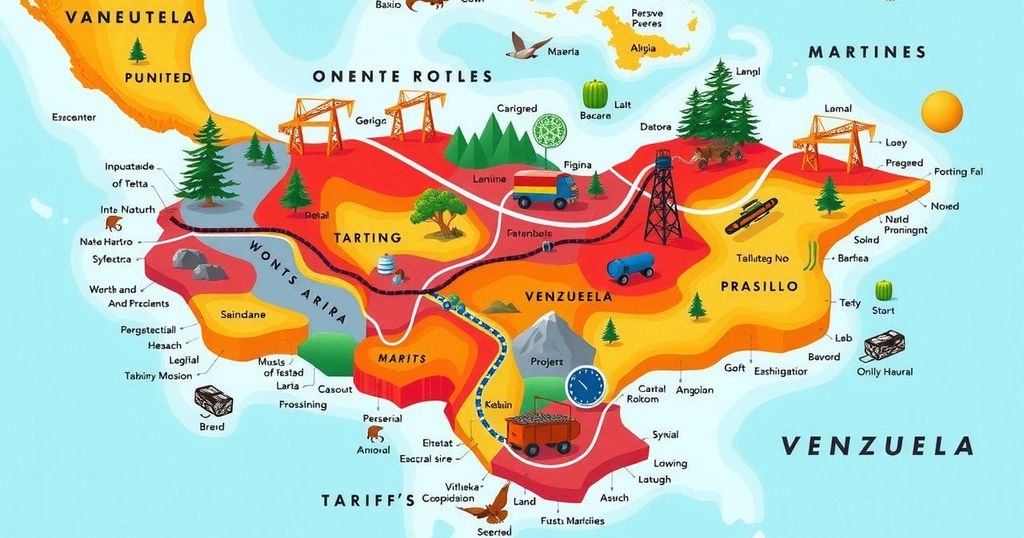Trump’s Tariffs on Venezuelan Oil Purchases: Implications for Global Trade

President Trump announced the commencement of 25 percent tariffs on countries buying oil and gas from Venezuela, effective April 2. This measure is likely to impact China and India significantly and is part of Trump’s broader strategy to impose tariffs on various nations. The situation remains dynamic, with prospects for more targeted tariffs as discussions with Venezuela continue.
United States President Donald Trump declared on Monday the implementation of significant tariffs on imports from countries purchasing oil and gas from Venezuela. This action may particularly impact nations like China and India, contributing to global trade uncertainty. Since resuming his presidency, Trump has consistently utilized tariffs as a tool to influence both economic and diplomatic dialogues, targeting allies and adversaries alike.
The announced tariffs will be set at a substantial 25 percent and are scheduled to take effect on April 2. Trump referred to this date as “Liberation Day” for the U.S. economy, promising reciprocal tariffs tailored to each trading partner to address practices deemed unfair by Washington. This move specifically targets nations involved in Venezuelan oil purchases, with a focus on China and India.
In his statement, Trump cited multiple reasons for what he termed a “secondary tariff,” accusing Venezuela of sending criminal elements into the U.S. He remarked that “Venezuela has been very hostile to the United States and the Freedoms which we espouse.” Previous U.S. sanctions had allowed Venezuela to direct its exports to major economies, including China and India, effectively circumventing the embargo.
The announcement also coincided with the suspension of deportations from the U.S. to Venezuela, attributed to Venezuela’s failure to comply with related agreements. Following recent talks, Caracas stated it has resumed accepting repatriations after a temporary halt, successfully deporting nearly 200 citizens from the U.S.
In addition to the Venezuelan tariffs, Trump indicated that more targeted tariffs could be considered, with possible adjustments impacting specific trading partners. A White House official noted that the situation remains “fluid,” casting doubt on the timing of sector-specific tariffs previously scheduled for April 2. Financial markets experienced temporary relief at the prospect of a more selective tariff implementation.
The White House has asserted its intent to impose significant tariffs on April 2 as part of Trump’s broader trade policy, which has previously claimed that “America has been ripped off by every country around the world.” Treasury Secretary Scott Bessent communicated that Washington aims to address trade imbalances, singling out about 15 percent of nations with which the U.S. faces significant trade deficits, termed the “dirty 15.”
In conclusion, President Trump’s announcement of steep tariffs on countries purchasing Venezuelan oil and gas represents a strategic measure anticipated to affect trade relations, particularly with nations like China and India. As the situation develops, there are possibilities for more targeted tariffs and adjustments which could reshape existing trade dynamics. The ongoing negotiations and diplomatic engagements with Venezuela further complicate this scenario, influencing U.S. foreign and economic policy.
Original Source: www.hindustantimes.com








